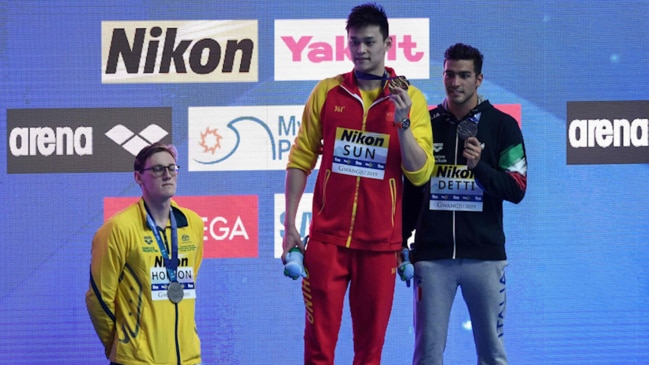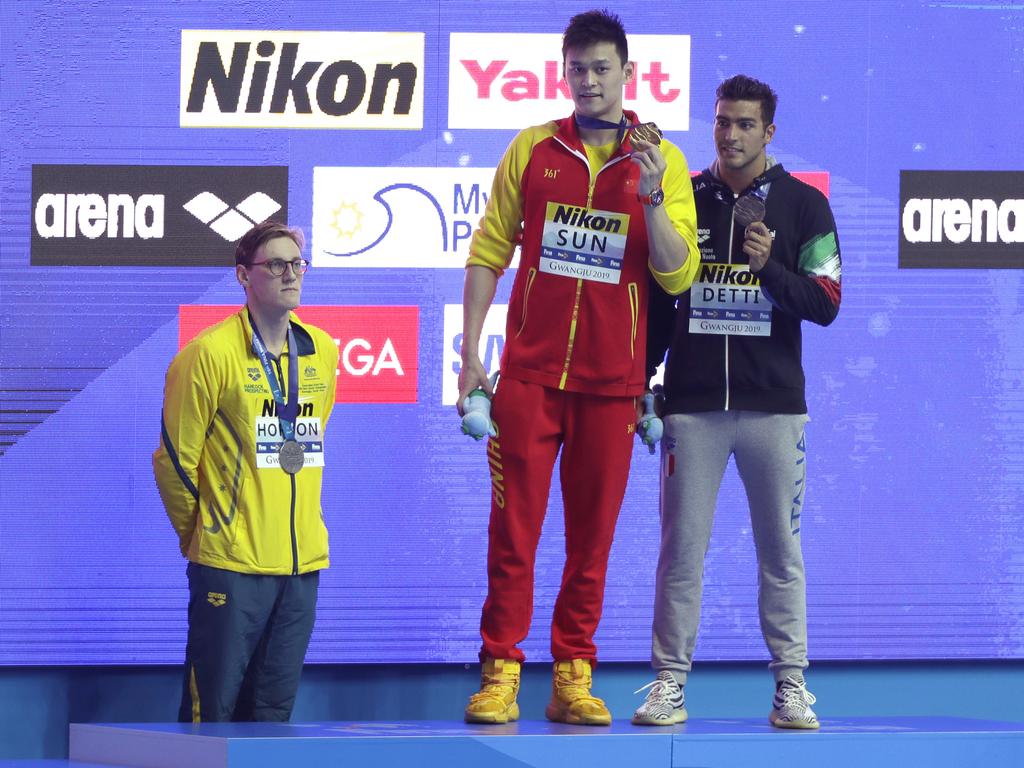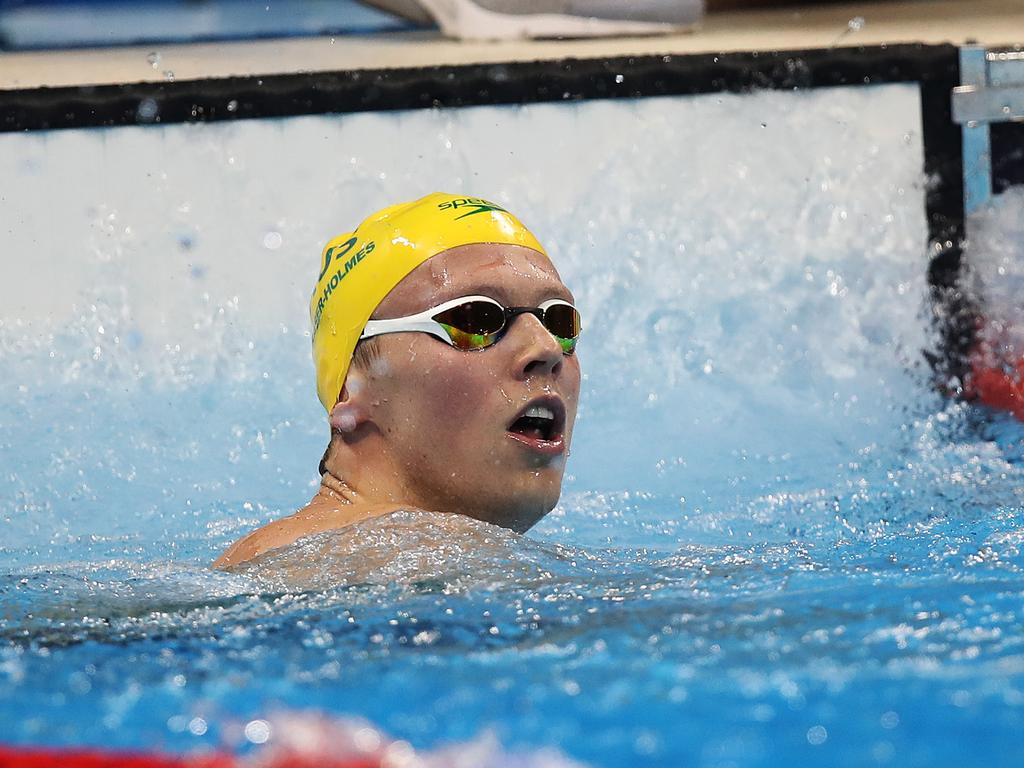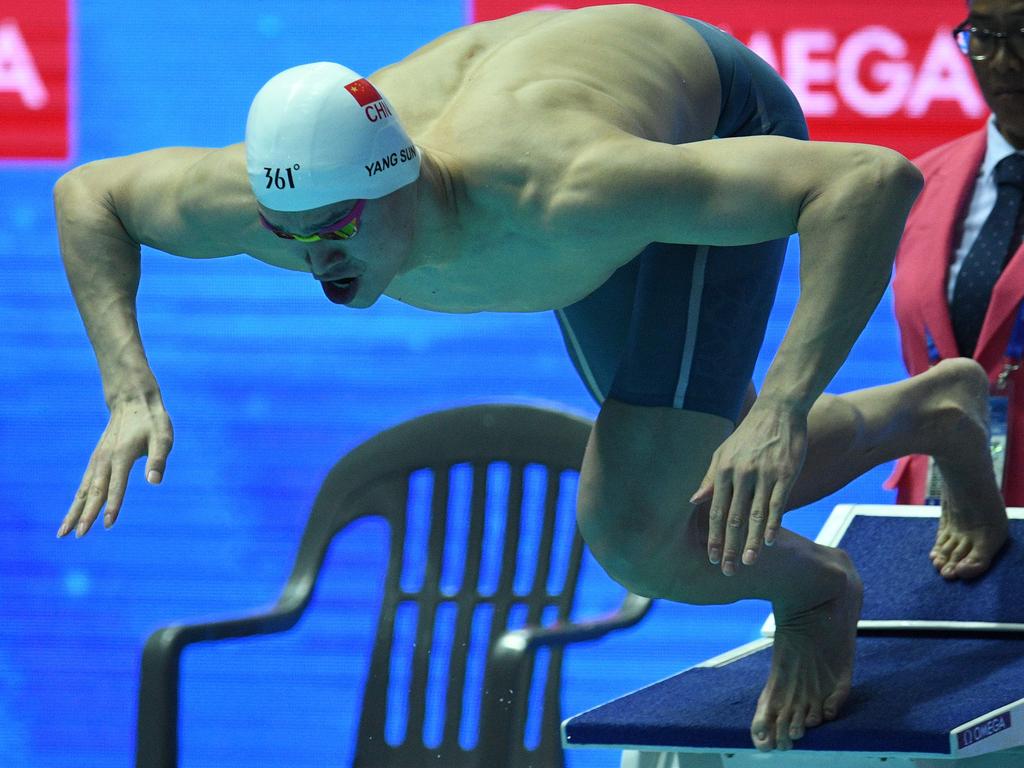Sun Yang storm won’t die down but critics asked to reflect
Sun Yang has been Australia’s favourite whipping boy this week but are critics guilty of overlooking some very important factors?

As debate around Sun Yang continues to rage in the wake of podium protests at the world championships, Australia — and indeed the rest of the world — is being urged to think deeper about the most confronting issue in sport right now.
But not everyone is keen to embrace other points of view when it comes to suggestions the Chinese swimmer may not be the villain everyone thinks he is.
Stream over 50 sports live & anytime with KAYO on your TV, mobile, tablet or laptop. Just $25/month with no lock-in contract. Get your 14 day free trial
Aussie star Mack Horton thrust Sun’s murky reputation back into the spotlight by refusing to stand on the dais with him after the men’s 400m final and Brit Duncan Scott did the same after the 200m final. Sun served a three-month ban in 2014 for taking a substance — that was for a long time beforehand deemed legal — and is facing a hearing in September about whether he has a case to answer for alleging smashing vials of his blood when visited by drug testers last year.
In an interview with The Australian, Sun’s frustrated Australian coach Denis Cotterell accused the swimmer’s critics of being “hypocritical” and maintains the 27-year-old “is not a drug cheat”. He also said the response coming from Down Under was rich because Australian swimmers have been guilty of doping offences in the past but didn’t face the same vitriol as what we’re witnessing this week — a point Cotterell has made previously.
RELATED: Depressing reality of swimming furore
RELATED: No respect is what Sun, China deserve
In 2017, months after Sun was embroiled in controversy at the Rio Olympics and labelled a “drug cheat” by Horton, Cotterell questioned why his pupil was being treated more harshly than former Aussie swimmers Samantha Riley and Kylie Palmer, who returned positive tests during their careers.
“It’s nice when you’re in glass houses,” Cotterell told The Daily Telegraph two years ago. “We go, ‘Oh yeah, great Mack. That’s a great statement’. And we say, ‘Oh yeah, we want a clean sport, we want this and that’. We say, ‘Oh doping isn’t systemic (in Australia), it’s not planned’. But Sun Yang is a cheat for life.”

After his most recent defence of Sun, social commentators were quick to rubbish Cotterell’s stance. Appearing on Sky News Australia on Wednesday night, journalist Jack Houghton said “it’s extraordinary for Denis to come out and defend him” given Sun returned a positive test in 2014.
Host of Sky’s Front Page program Peter Gleeson agreed, adding: “It’s all very well for Denis Cotterell to say that but the reality is that this guy has been done for drug cheating.”
DOUBLE STANDARDS AT PLAY?
The issue Cotterell has raised of being quick to condemn alleged cheats from overseas without looking in our own backyard has been brought into the spotlight this week given Thomas Fraser-Holmes is back in the Australian team in Gwangju.
Fraser-Holmes never tested positive to a banned substance but served a one-year ban for missing three drugs tests in the space of 12 months. Olympian Jared Poort also received the same penalty, causing him to miss out on potential selection for the 2018 Commonwealth Games.
The question has been asked, if Horton is intent on calling out drug cheats from other countries, what will he say to his compatriots who have been banned for falling foul of doping regulations?
An article published on Wednesday in China’s Global Times said: “Horton's teammate Thomas Fraser-Holmes, also a freestyle specialist, served a 12-month suspension starting in 2017 for missing three drugs tests in 12 months. But outspoken Horton did not say a thing to his teammate.
“If Horton is trying to keep sport clean by requesting a ban on Sun, why did he not speak a word about his teammate for dodging doping tests?”

Australian sports journalist Andrew Wu has been vocal on that very issue this week, describing it in a column for the Sydney Morning Herald as “the elephant in the room Horton has to address”.
In footage aired on Channel 10 program The Project, Wu said: “Australians are quite right to consider Sun Yang a drugs cheat but there’s an Australian swimmer in the world championships team who did serve a 12-month ban for failing to submit three drug tests over a 12-month period — Thomas Fraser-Holmes.
“Now he’s back in the Australian swim team, if Mack Horton wants to take this strong anti-drugs stance, then I think he should be asking questions of his own teammates.”
Australian athlete makes rapid improvement = ðŸ‘ðŸ‘ðŸ‘
— Andrew Wu (@wutube) July 21, 2019
Athlete from non-English speaking country (let’s say Russia, former Eastern Bloc or communist nation) makes rapid improvement in short time = 🤔🤔🤔 pic.twitter.com/3TC7aK9dg8
QUESTION CRITICS MUST CONSIDER
Former CEO of the Australian Sports Anti-Doping Authority (ASADA) Richard Ings has been outspoken all week about the need to refrain from passing judgment on Sun until his hearing with the Court of Arbitration for Sport (CAS), and was another who drew comparisons with how Australian athletes would be treated if they were in the same position.
“The presumption of innocence needs to be firm with all these types of matters,” Ings told Ben Fordham on 2GB radio. “We would be very upset if this action was taken against an Australian athlete with such an implication. We need to show the same respect for our international competitors.”
The Project co-host Waleed Aly also raised a pertinent point when discussing Sun’s upcoming CAS hearing over the alleged destruction of vials containing blood samples.
Sun was found not guilty by an independent panel convened by swimming’s governing body FINA, but the World Anti-Doping Authority (WADA) appealed the verdict, which is why the Chinese star’s matter is still not resolved.
Aly questioned if it was wise for so many of Sun’s critics to be using this particular episode as evidence against him when he hasn’t actually been found guilty yet.
“Is there a danger of taking that and just importing that into the ‘now’ when it’s quite a different circumstance?” he asked former Australian Olympic sprinter Raelene Boyle.
Boyle wasn’t prepared to show Sun any leniency, saying Horton was right to protest like he did because cheating in sport is a stain that must be eradicated.
Boyle has perfectly legitimate reasons for supporting the swimming protests, given she won two silver medals at the 1972 Olympics — but was beaten in both the 100m and 200m events by East Germany’s Renate Stecher, who was later found to have used performance enhancing drugs.
Understandably, Boyle has no tolerance for doping and is fully behind any action that ensures justice prevails.

WHERE TO FROM HERE?
Aussie athletes like Dawn Fraser, Sally Pearson and Libby Trickett are among many current and former sports stars who have come out in support of Horton and Scott for protesting on the world stage. It’s been reported Horton received a standing ovation when he returned to the athletes’ village after his display of defiance, so clearly he has the backing of his peers when it comes to his stand against Sun.
Sun has been the target of plenty of vitriol but much of the frustration around his situation has also been directed at FINA for allowing him to compete when he has a CAS hearing coming up.
If his original not-guilty verdict is overturned, Sun faces the prospect of a lifetime ban and the gold medals he’s won in the 400m and 200m in South Korea would represent a complete farce — and his fellow swimmers’ anger towards him and FINA would be entirely justified.
But if he’s found not guilty for a second time, it’s possible one of two things will happen — either the outrage meter may be turned down a notch, or the resentment towards FINA will increase because of a belief not enough is being done to ensure swimming is clean.




